OCCUPY CENTRAL - DAY 22: Full coverage of the day’s events
Police accused of concealing badge numbers during Mong Kok clash
PUBLISHED : Sunday, 19 October, 2014, 5:45am
UPDATED : Sunday, 19 October, 2014, 5:45am
A vest conceals the ID number of a police officer. Photo: K. Y. Cheng
Nearly half the police officers who clashed with protesters in Mong Kok on Friday had their identification numbers obscured, a protester said, alleging they had done so intentionally.
Demonstrator Lau Hoi-ho said about 40 per cent of front-line officers had concealed the ID numbers on their shoulder epaulettes under their reflective vests during the violence, up from about 10 per cent who appeared to do so last week.
Chief Superintendent Hui Chun-tak, of the police public relations bureau, did not confirm or deny the allegation that the officers hid their numbers deliberately. He said the reflective vests were "part of the normal uniform" and that the incident needed looking into.
Protesters maintain that police are hiding their badge numbers to make it difficult to hold them accountable for abuse.
Officers who stood to the side of Nathan Road could be identified clearly, as they wore their vests under their epaulettes. "But many who stood in the middle of Nathan Road, waiting to take action, did not have their identification numbers visible," Lau said.
He asked some officers to make the numbers visible, he said, but was ignored.
Lam Cheuk-ting of the Democratic Party said officers should clearly identify themselves: "If not, the public cannot follow up in case they have complaints."
Officers are obliged to identify themselves upon request when carrying out their duties, either by full name or ID number. Surnames, unless very unusual, are generally not considered specific enough.
Police officers in plain clothes should identify themselves and produce their warrant cards when performing their duties. Officers in uniform are normally not required to produce their warrant cards, which contain their names and badge numbers. But the police website says they should do so upon the public's request "unless the circumstances do not allow or the request is unreasonable".
A police officer shall also ensure he or she is "correctly dressed" when in uniform.
Police in Britain and Canada were criticised for removing their numbers during stand-offs with protesters against Group of 20 summits in 2009 and 2010. Officers in Ferguson, in the US state of Missouri, faced similar accusations this year.
Hong Kong police deploy dogs for the first time in Occupy protests
Police appear to have stepped up their offensive against Occupy Central by using dogs to control protesters.
Officers deployed at least three police dogs early yesterday to help drive back angry crowds who tried to block Lung Wo Road outside the chief executive's office in Admiralty. While kept on leashes, the dogs reacted to the loud chanting with ferocious barking and lunges at the 100-odd protesters. While the animals kept the crowd at bay, officers were able to haul off arrested protesters.
"Whether police dogs are used will depend on the situation," Chief Superintendent Hui Chun-tak, of the police public relations bureau, said. "They are used especially when [the police are] faced with sudden emergencies."
He did not reply when asked if using dogs was an escalation of force by officers after the use of batons, pepper spray and tear gas. He also did not give an answer as to whether the dogs would be used again. Hui said dogs were part of regular patrol units. "They are mainly used for defence," he said.
Thirteen animal rights groups yesterday released a joint statement condemning the use of dogs in dealing with protesters, saying it could be detrimental to both animals and humans.
The Police Dog Unit dates back to 1949. Today there are 117 trained police dogs, made up of 73 patrol dogs, 27 working in drug detection and 17 used for detecting explosives. Most of the dogs are malinois, a medium-size mixed breed known for its agility and high energy.
Jennifer Ngo
This article appeared in the South China Morning Post print edition as Police accused of concealing badge numbers
Fresh clashes in Mong Kok ahead of televised talks to end Occupy protests
Protesters and riot police square off in Mong Kok after concerted efforts by both sides to stop an escalation of street confrontations
PUBLISHED : Saturday, 18 October, 2014, 4:53pm
UPDATED : Sunday, 19 October, 2014, 1:58pm
Police confront pro-democracy protesters trying to reoccupy Nathan Road in Mong Kok early this morning. Photo: Sam Tsang
New clashes broke out between protesters and police in Mong Kok early this morning, after a day which saw significant progress on attempts to bring students and the government round the table to thrash out a solution to bring three weeks of street protests to an end.

The fresh trouble is understood to have followed an online call "to take the junction of Argyle Street and Nathan Road after midnight", prompting scores of riot police to rush to the scene.
Pepper spray was used at least once to disperse protesters.
Officers used batons to hit out at protesters' umbrellas, according to witnesses at the scene.
One protester said he saw plain-clothes policemen lashing out at protesters themselves.
"I saw officers hitting protesters with batons. Several protesters suffered head injuries and were bleeding. They also dismantled supply stations," the protester, who gave his surname as Lo, said.
One of the student protest leaders, Lester Shum from the Federation of Students, was present at Mong Kok to show support. He said that the demonstrators there were upholding the principles of civil disobedience and he didn't know why officers had charged at them.
"We are not gangsters. Even if you beat us until we bleed, we will come back as we want genuine universal suffrage and civil nomination," said Shum.
Watch: Injured protester: Hong Kong police officer hit me
In a statement, police condemned protesters' actions, saying they had severely disrupted public order.
"In the small hours of today, a large number of people who were illegally occupying the carriageway on Nathan Road near Argyle Street in Mong Kok suddenly attempted to charge police cordon lines by pulling the mill barriers thereat and shoving police officers. Police then gave warnings to them repeatedly, including displaying warning banners, to urge them to stop charging police, but was ignored," the statement read.
"Police thus took resolute action by applying minimum force to disperse them to prevent the situation from deteriorating. After putting back the mill barriers at scene, police returned to the original cordon lines. Police did not carry out clearance."
The statement said one man was arrested after he was allegedly found with two knives in his backpack. Three protesters were reported to have been injured and a police officer suffered from a dislocated shoulder, it added.
Meanwhile RTHK reported that a man had been arrested in Tin Shui Wan on Saturday night on suspicion of encouraging people over the internet to take part in illegal assemblies in Admiralty and Mong Kok and to charge at police.
The latest disturbances came as talks aimed at ending the increasingly violent confrontations over the city's electoral future looked set to go ahead. Government and mainstream pro-democracy movement leaders united in condemnation of violent clashes between police and protesters.
Watch: Violent clashes in Mong Kok lead to arrests and injuries overnight
In what appeared to be a concerted attempt to stop an escalation of street confrontations and isolate radical protesters ahead of Tuesday's talks, government No 2 Carrie Lam Cheng Yuet-ngor, the Executive Council and pro-government groups condemned violent clashes on Saturday in Mong Kok.
Their call was echoed by Occupy Central co-founder Dr Chan Kin-man and student leader Lester Shum, who both said talks and non-violence should be the only way forward.
Police commissioner Andy Tsang Wai-hung - who has been absent from public view during the past three weeks of turmoil - also delivered a stern warning over what he described as actions that were "hurting Hong Kong and hurting our society".
Shum's call for non-violent protest - in which he also agreed talks should be within the framework of the Basic Law - came with a caveat that it was the hardline August 31 decision by the National People's Congress on elections that had kept people on the streets. "We are afraid the [Chief Executive] C. Y. Leung camp will try to sabotage the chances of dialogue, and so we need to hold fast to non-violence, which is our biggest strength," he said.
Thirty-three people aged 20 to 66 were arrested after clashes in Mong Kok and Lung Wo Road in Admiralty early on Saturday.
READ MORE: Protesters form new blockades in Mong Kok after night of chaotic clashes with police
Interactive map: Current barricades in Mong Kok
Legislative Council president Jasper Tsang Yok-sing said most peaceful demonstrators would not agree to violence. "It [the violence] definitely exceeds the limit of civil disobedience. I can't see they are conveying any messages. It should not happen."
Forty-one pro-establishment legislators issued a joint statement criticising Saturday's clashes, in which more than 10 police officers and an unknown number of protesters were injured.
In an article in Chinese-language newspaper Ming Pao yesterday, Occupy's Chan called on protesters and police to show restraint. Chan also reiterated that the three Occupy Central organisers and pan-democrats would turn themselves in when the movement ends.
Meanwhile, students were preparing for the two-hour meeting with five government officials at the Hong Kong Academy of Medicine. Professor Leonard Cheng Kwok-hon, president of Lingnan University and an ex-adviser to Leung Chun-ying's election campaign, will moderate.
This article appeared in the South China Morning Post print edition as Fresh clash ahead of talks to end protests
Occupy co-founder 'saddened' by Mong Kok clashes; warns against expanding protest zones
Chan Kin-man blames government inaction on sincere dialogue with students for the flare-up in tensions
PUBLISHED : Saturday, 18 October, 2014, 3:13pm
UPDATED : Saturday, 18 October, 2014, 5:43pm
Occupy Hong Kong leader Chan Kin-man. Photo: EPA
Occupy Central co-founder Dr Chan Kin-man said he was saddened by the clashes overnight in Mong Kok and criticised the police for “arousing conflict”.
“Many Hongkongers are saddened by what happened in Mong Kok,” he said on Saturday. “We don’t want policemen and young people to get hurt because this is not a public order problem, it’s a political problem ... It’s a problem with the government’s response and should be solved by political means.”
At least 26 people were arrested after the violence erupted in the later hours between Friday evening and Saturday morning, which saw officers use pepper spray and batons to push back demonstrators.
Thousands of people – police estimated 9,000 – surged into the streets and helped Occupy supporters carve out new protest zones, including parts of Nathan Road and Argyle Street.
“Last night was weird because the police knew that they couldn’t ... stop people from gathering by using pepper spray, but they still used it, so it was only arousing conflict,” Chan said.
Chan said police should know that Mong Kok is different from the Causeway Bay and Queensway occupation zones. The latter two have a small number of protesters during the day and night, while Mong Kok crowds grow during the evenings, he said.
He criticised police officers for “violently and crazily” hitting protesters’ umbrellas with their batons in Mong Kok on Friday night. He added that Police Commissioner Andy Tsang Wai-hung's condemnation of Occupy Mong Kok today - in which he described the movement as "radical", "unlawful" and "violent" - was an excuse to "legitimise" the force's heavy-handed approach.
"It was a bit strange that the police chief has remained silent until this morning ... Maybe Tsang wanted to legitimize the government's tough approach," Chan said,
"Vut no one wants to see what happened in Mong Kok on Friday, everyone is saddened by it, but the origin of the problem is that the government is putting the police and protesters on opposing fronts," he added.
In an article published in newspaper Ming Pao on Saturday, Chan urged protesters not expand occupy zones outside of those in Admiralty, Mong Kok and Causeway Bay.
“I know, in the last few nights, many people want to occupy more places. I just want them to think about how to choose between advancing and retreating, how many people can we get to stay there?
“Let’s think: are we falling into the trap of those who wanted to suppress the movement with public discontent? In the face of vigorous offensives, would we lose control and respond with violence? If we do, the moral foundation of the whole movement would collapse,” he wrote.
Asked if the movement was deviating from its non-violent stance, Chan said: “Most people did not intend to attack the police. They either used umbrellas to protect themselves or raise their hands [to show they are peaceful], but the police’s clearing action would only make the protesters and officers lose control and put them on opposing fronts. So I call on everyone to show restraint.”
Chan, a sociology associate professor at Chinese University, blamed the escalation in tensions on the government.
“The biggest responsibility is on the government ... because it has taken 21 days and officials are still not talking to students,” Chan said. “Many people are expecting an upcoming dialogue that will bear fruit and solve the problem.”
"The government must respond as soon as possible and talk, the students are sincere ... But I wonder whether the government is sincere too," he said.
Chan also reiterated that the Occupy organisers and pan-democrats would turn themselves in when the movement ends.
“If this occupying act comes to an end, we will sit here and get arrested. If the police don’t arrest us, we will queue up quietly to turn ourselves in. We have to tell the world that we are but challenging the rule of law – instead, we embrace it.
“If the charge is reasonable, the Occupy trio and some others would not defend ourselves in court, we won’t hire any lawyer, and we will only make our political statement, to explain about the origin and developments of the occupying act,” he wrote.
He added that Cardinal Joseph Zen, Democratic Party founding chairman Martin Lee Chu-ming and many pan-democratic lawmakers also planned to turn themselves in at the end of the movement.
But Chan emphasised this would only be after the demonstrators decide it is over.
“We will turn ourselves in if protesters decide to leave peacefully after an official dialogue with students,” Chan added. But if a dialogue is unsuccessful, the Occupy co-founders would not do anything to end the movement.
He also declined to say whether the organisers’ decision would end all occupations.
“We don’t know whether the people will agree with our choice, and they will make their decisions,” he said.
http://www.scmp.com/news/hong-kong/article/1619611/police-accused-concealing-badge-numbers-during-mong-kok-clash
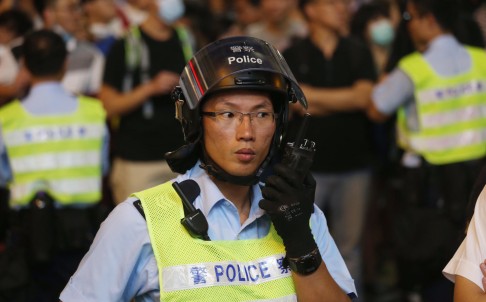

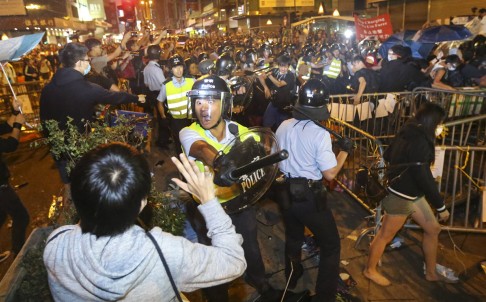
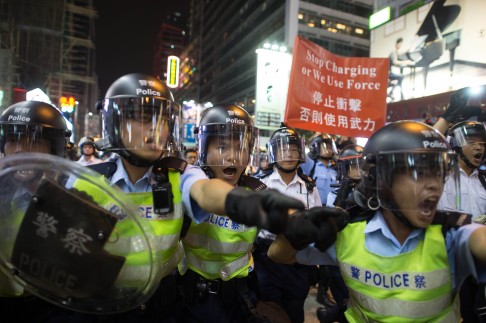
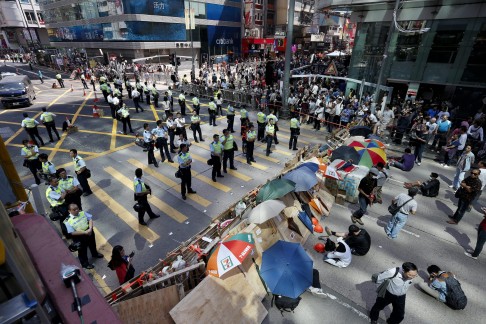
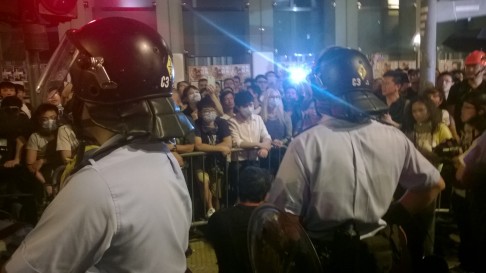
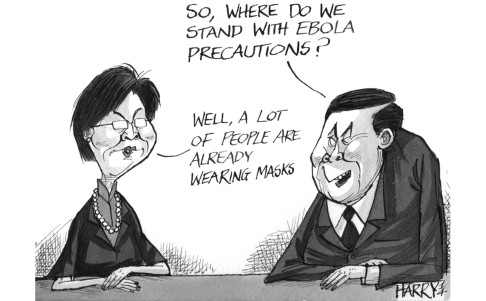
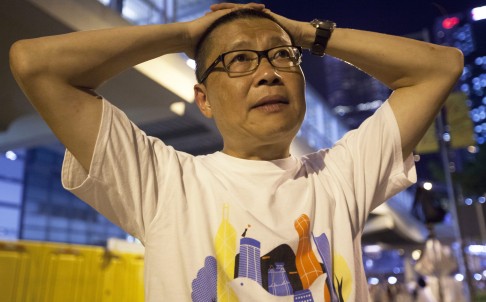
沒有留言:
張貼留言